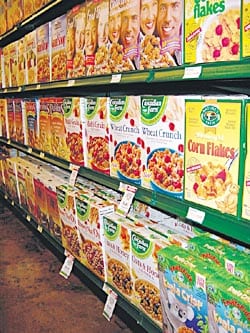The changing face of organic foods
by Cameron Woodworth
This article was originally published in September 2002

In honor of September as Organic Harvest Month, we take stock of …
As an activist promoting organic foods for the better part of a decade, I have a bias to confess: I’ve always been excited by the explosive growth of the organic market. The numbers reveal that I’ve certainly been getting my wish: Back in 1990, the organic food market was a sleepy industry with sales of about $1 billion. Today, sales are fast-approaching $10 billion per year, and now everyone wants to get into the act.
The number of choices my organic-loving friends and I have today as we walk down the aisles of our local PCCs is staggering, compared to my first visit to a PCC 11 years ago — let alone a small health food store back in the ’70s.
Today, there are far more organic juices, cereals, convenience foods, salad dressings, you name it. PCCs themselves have become bigger and more numerous, a trend that’s likely to continue in the future. Even mainstream brands and supermarkets are getting into the act.
For organic activists, it’s always been a simple argument: As the organic market expands, more people are eating health-fully, and consumers are shifting away from foods that require harmful pesticides and synthetic fertilizers. If organic on a small scale is better for people’s health and the environment, then bigger is even better, right?
It’s a rapidly changing world, however, and many of us haven’t figured out quite what to make of it. Today, Boca Burgers — once cheered loudly when President Clinton introduced the veggie patties to the White House — are now owned by Philip Morris, the world’s largest tobacco company. Odwalla, a pioneer in natural juices, is now owned by Coca-Cola.
General Mills, the third biggest food conglomerate in America, now owns Cascadian Farms, one of the original organic food companies. White Wave, the maker of Silk — the nation’s most popular soy drink — was bought out recently by Dean Foods, the nation’s largest dairy company, for $189 million.
Tyson Foods — the huge chicken company long vilified by natural foods activists for its poor environmental and animal rights record — has been test-marketing an organically grown chicken product for a year. Today, you can buy organic TV dinners — an oxymoron to many. And some of the original organic farmers in the country are increasingly worried as organic farming becomes more industrial in nature. Some are even looking for alternatives to the term “organic,” thinking it has lost some of its original meaning.
I remain excited about the growth of the organic market, and think it’s an overall positive development. It’s just that now a little doubt about the value of “big” is creeping in. The organic market may be exploding with growth, but it is not happening without growing pains.
Organic: trendy, and attracting legions of new customers
A year ago, a Roper poll found that 40 percent of Americans expected organic foods to be a bigger part of their diet within one year. According to the survey, 63 percent purchase organic foods and beverages at least sometimes.

Most Americans now think that organic food is more healthful than non-organic food — 56 percent, according to a separate Roper poll this year. The newer survey found that 72 percent of Americans, given a choice of two identical foods, would purchase the one with an organic label.
PCC member Dennis Weaver offers lively “Change your food — Change your life!” seminars and tours in the Seattle area for people who are brand new to organic foods. “I hear story after story about how people — from all walks of life — are so excited about the many great organic food choices they have at the grocery store. It’s an exciting new world for them.”
Author Michael Pollan, in a seminal New York Times Magazine article last year describing changes in the industry, “Behind the Organic-Industrial Complex,” writes that about ten percent of the U.S. food market is made up of “true naturals” — highly committed, activist consumers. “True naturals are the people on whom the organic food industry has been built, the outwardly directed, socially conscious consumers devoted to the proposition of ‘better food for a better planet.'” But today, organic food manufacturers are increasingly focusing on the “mid-level” organic consumers, or as Pollan calls them, the “health seekers.”
Health seekers, about a quarter of the market, buy organic foods for the perceived health benefits. They buy supplements, work out and drink wine, yet are still looking for the types of foods they’re familiar with. Organic food manufacturers are now creating products that appeal to this new breed of shopper.
This influx of health seekers has led to the organic TV dinner, and has some true naturals worried that we may be headed toward the organic Twinkie™ as well. PCC itself has had to adapt with the advent of big, national labels into natural foods. With growth, the larger volume allows PCC to get ever better prices on what it buys and to pass the savings on to customers.
PCC’s growth also allows it to provide leadership and develop programs, such as the Farmland Fund, that it couldn’t have dreamed about in years past. Throughout the changes, PCC and many co-ops across the nation remain steadfast in supporting small, local growers and processors, something national operations can’t do.
The dramatic growth of the organic market, Pollan writes, “has attracted the attention of the very agribusiness corporations to which the organic movement once presented a radical alternative and often a scalding critique.”

The rise of industrial-organic
As more and more mainstream supermarkets start offering organic foods, they are relying on huge organic farming operations to supply them. In California, the biggest organic farming operations are owned and operated by conventional mega-farms, which look much like any industrial farm in the state.
To many people, industrial-organic is a good thing. These big business organic farms and processors help lower organic food prices. Lower prices help bring even more consumers into the organic fold. Big business involvement in organic foods means that a great many more acres of American and foreign land will be converted to organic production. Also, some activists hope that organic agriculture, threatened by cross-contamination from genetically engineered crops, has gained in big business a new and powerful ally in the fight to keep organic foods uncontaminated by biotech.
Jeff Nelson, who runs VegSource.com, a popular vegetarian website, thinks it’s mostly positive that mainstream companies have become interested in organic foods. “What I care about is all these people who aren’t vegetarian, but are eating more veggie burgers.” He adds that White Wave’s organic “Silk” milk has stronger capital backing now, and can make even greater inroads into the mainstream. Ironically, Dean Foods’ financing of Silk milk may hurt its own conventional dairy sales.
Craig Winters, a colleague of mine who serves as executive director for The Campaign to Label Genetically Engineered Foods, thinks organic TV dinners and snacks can serve as valuable transitional foods to encourage people from the mainstream to move toward a more healthful — and ultimately more organic lifestyle.
Seventh Generation manufactures and distributes a wide variety of eco-friendly cleaning products, paper towels and more. Its president, Jeffrey Hollender, says regardless of which corporation owns natural food labels, organic foods are still organic foods — the same rules apply, whether they’re made by Mom, Pop, or Archer Daniels Midland.
The advent of natural foods into chain supermarkets also means “people who would not otherwise even see them may actually try them, and such mainstreaming can only further increase the healthy pressures natural foods are starting to exert on our food system at large.”
For others, the trade-offs are substantial. Some are concerned that the U.S. Department of Agriculture, which is instituting national organic labeling standards next month, is allowing organic food to become more processed. Over the past 12 years, some representatives on the National Organic Standards Board (NOSB) have wanted to keep even minor, synthetic food additives such as ascorbic acid and xanthum gum out of the new organic standards.
Others on the NOSB, specializing in food processing, said it would be virtually impossible to have organic processed foods such as soups, cookies, frozen pizza, and even flavored yogurts and silken tofu without some synthetics. PCC’s Nutrition Educator, Goldie Caughlan, is a member of the NOSB and is on both the Materials and Processing Committees. She says lively debate and extreme caution go into every material analysis and review, recognizing that consumers want organic convenience foods.
Activists are concerned that many of the giant agribusinesses and mainstream supermarkets now involved in organic foods see it merely as a niche market and don’t share the principles of small organic farmers. Now that organic is established, agribusiness is moving to own it. As Pollen writes, the question is what are they going to do with it?
David Gould is a Portland, Oregon-based organic foods inspector and certifier. He tells Salon.com about the culture clash that occurs when big business and organic agriculture mix. “The food distribution system is totally screwed up,” he says. “If you want to supply the big supermarket, you have to have a lot of product. Big companies like General Mills tend to process huge amounts of food, which results in huge demand for food. This puts small farmers at a disadvantage and results in the ecologically indefensible practice of monoculture … because you need to feed this machinery at an insane rate.”
“The story in this country is that wealth concentrates,” he adds. “That’s unstable. We need smaller operations, local processors, more evenly spread-out capitalism.” “I was inspecting a Japanese food processor,” says Gould, “who was importing soybeans from China to process into goods for export to Europe. Isn’t this a little bizarre, a little … unsustainable?”
Beyond “Organic?”
Farmer Eliot Coleman of Maine, author of “The New Organic Grower” and former co-host of the Gardening Naturally program on The Learning Channel, is a long-time leader in the organic food movement. Lately, he’s been shying away from the “organic” term, using the phrase “authentic food” instead. It’s a phrase that hasn’t made inroads yet, but reflects dissatisfaction that some true believers feel about industrial-organic.

“When I started as an organic grower 35 years ago, it was a simpler world,” he wrote recently in Mother Earth News. “Organic was a way of thinking rather than a ‘profit center.’ The decision to farm organically was a statement of faith in the wisdom of the natural world, to the quality of the crops and the livestock, and to the nutritional benefits of properly cultivated food. It was obvious that good farming and exceptional food only resulted from the care and nurturing practiced by the good farmer.”
Those inside the organic industry are the first to recognize that more work must be done to emphasize bio-regional food systems. Nonetheless, organic has emerged as one of the few positive things happening in agriculture today. It’s a great success story of a grassroots movement gaining mainstream momentum, with the chance for cooperation between large corporations, small farmers and the USDA. The industry has enough heft now that we have the opportunity to look ahead to what the next step for organic might be.
“If it weren’t for the big guys like General Mills,” says PCC’s Caughlan, “we could be in a very different place now with organics. Instead of feeling, ‘Oh, “Big Ag” is doing organic too, so it’s not good anymore,’ and shooting ourselves in the foot, we should be throwing a party! We’ve just taken our first big step. Yes, there’s much more to do, but the foundation is sound.”
With the mainstreaming of organics, consumers new to organics are truly excited about the choices they’ve discovered. For every criticism of what organic is or isn’t or who’s doing it now, there are new consumers every day discovering organic milk, cereal, baby food, or vegetables for the first time. They are thrilled to find and learn about a healthier choice for their families. Many of us hope that the mainstreaming of organics won’t amount to a corruption of the ideals that organic represents, but rather the start of a large-scale transformation into a truly sustainable food system.
Next month, Goldie Caughlan will write about the USDA Organic Standards that take effect October 21 and the challenges ahead.
